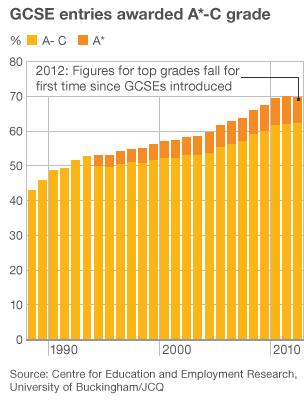First fall in GCSE grades in exam's history
- Published
Renna and Karim open their GCSE results live on-air
There has been a fall in the proportion of GCSEs awarded an A*-C grade, for the first time since the exams were introduced 24 years ago.
This year's results show 69.4% of entries earned grades A*-C, compared with 69.8% last year.
There is also a fall in the proportion of pupils receiving the top A* and A grades, down to 22.4% from 23.2%.
About 658,000 16-year-olds in England, Wales and Northern Ireland are receiving their results.
A further 547,000 candidates, many of whom will have sat exams a year early or as adults, are also receiving their grades.
The pass rate had steadily risen since the exams replaced O-levels and CSEs in 1988, when 42.5% of entries were awarded an A*-C grade.
By 2010 69.1% were awarded these grades, prompting accusations of grade inflation.
Grade boundaries
The proportion of entries awarded top grades had also risen every year.

In an attempt to address concerns of "dumbing down" and ensure results were comparable, England's exams regulator, Ofqual, told exam boards they would have to justify any results notably different to those of previous years.
This year a number of new GCSE syllabuses, including English, mathematics and ICT, are being assessed for the first time. So extra measures are taken to ensure grades are comparable.
The system known as "comparable outcomes" - which focuses on the proportion of students achieving each grade - sparked accusations that the exam boards were being asked to fix results.
The Association of Teachers and Lecturers said there were concerns about the approach.
An Ofqual spokeswoman said: "We don't 'fix' grades - but we do make sure that grades are right. We have developed our approach with the help of the best experts in the field, and we are open about what we do."
She added: "Results do go up or down, for various reasons. They don't stay exactly the same each year, in each subject.
"But we have to be as sure as we can be that any movement is for a good reason, and that is what we do."
Thursday's statistics show a decrease in the proportion of GCSEs awarded at least a C grade in the core subjects of English, maths and science. The fall is particularly pronounced in English.
In English literature, 76.3% of exams were awarded A*-C, compared with 78.4% last year, and 23.2% earned at least an A, down from 25% in 2011.
In English language and combined English literature and language exams, results went down from 65.5% getting A*-C to 64.2%.
And head teachers representing dozens of schools say some students have been marked down by an entire grade in English compared with the results that teachers had predicted.
The results in numbers
69.4% of entries earned grades A*- CIt's a drop of 0.4 percentage points on 2011
English lit A*- C grades fell significantly
78.4%
76.3%
So did A*- C grades in science...
62.9%
60.7%
Overall, girls beat boys A*- C
73.3%
65.4%
Change in take up since 2011
- Science 36.5%
- German 5.5%
- Spanish 10.0%
- French 0.5%
But the Joint Council for Qualifications, which publishes the annual results, said they were happy with the grades awarded and the drop in A*-C English results was partly down to fewer candidates sitting the exam earlier, during the winter exam season.
Gender gap
In science, which has been made tougher, there has been a 2.2 percentage point drop in the proportion of entries awarded an A*-C grade. Some 60.7% are achieving these good grades.
There has also been a fall in A*-C results in maths, with 58.4% of entries getting at least a C grade, down from 58.8% in 2011.
This year's results also show the gap between girls and boys stalled at the very top grades, with 18.9% of boys' entries achieving an A* and A, compared to 25.6% of girls' entries - a percentage gap of 6.7%, the same as in 2011.
At grades A* to C, girls are outperforming boys, with 65.4% of boys' entries attaining that level, compared to 73.3% of girls' entries.
The decline in the number of pupils opting to take modern foreign languages slowed this year, with even a rise of 10% in the number of those sitting Spanish GCSE.
The number of entries for French fell by 0.5%, compared to a 13.2% fall last year, and the entries for German fell by 5.5% compared to a 13.2% fall in 2011.
There was also a rise of 13.7% in the uptake of other modern languages, including Arabic, Chinese, Persian, Polish, Portuguese and Italian, which all saw significant increases.
Hard work
Schools minister Nick Gibb said: "Tens of thousands of young people are today reaping the rewards of their hard work over the last two years. It is right that we congratulate students on their results and thank the inspirational heads, teachers and support staff that have helped them succeed."
Head of the Nasuwt teaching union Chris Keates said the government may seek to claim the dip in grades was the result of its "toughening up" exams, but that this was untrue.
But she added that it would not be long before results were affected negatively by government spending cuts and its "elitist" reforms.
NUT general secretary Christine Blower said the raising of school GCSE targets to 40% of pupils getting five good GCSEs (including English and maths), combined with shifts in grade boundaries meant many schools would face "a double whammy".
She added: "If classified as 'failing', they (schools) will of course be more threatened with academy conversion."
Pupils in Scotland, who take Scottish Standard Grade and Higher qualifications, rather than GCSEs and A-levels, received their results earlier in August.
- Published23 August 2012
- Published17 September 2012
- Published23 August 2012